When a child leaves your nursery ‘school-ready’, their chances of successful life outcomes are up to 11 times higher (particularly in relation to maths skills) – 11 times!
With help from experienced headteacher Richard Grogan, we share tried and tested activities for school readiness that every nursery manager should know about.
Meet the expert: Richard Grogan

When it comes to school readiness, Richard Grogan knows his stuff! As the experienced headteacher at Orchard Head Infant and Junior School in Pontefract, he has spent over 17 years helping children transition smoothly into school life and thrive.
Richard shares a unique perspective. As the leader of a nursery and infant school, he sees firsthand what makes a real difference in preparing children for Reception.
From essential independence skills to building confidence in early learners, he works closely with children, parents, and the early years team to ensure every child gets the best possible start.
What does a school-ready child look like?
Richard explains that there’s no one-size-fits-all approach to school readiness – every child is unique and needs different kinds of support.
‘Getting them ready for their next big step is about building confidence and independence, not expecting perfection. Being school-ready is not about their academic ability, how well they can write their name or even how well they know their numbers to 10.’
Richard Grogan, Headteacher Orchard Head Infant School
He describes a school-ready child as one ready to get stuck into activities without basic skills holding them back. When children move up from nursery to reception, the ratio of adults to children will likely change from 1:8 to 1:13. This allows children to explore their learning with more independence.
If a child relies on adults for communication, imagination, resilience, and basic self-care (like toileting), their learning is paused every time they ‘wait’ for assistance.
It’s not just their enjoyment and early development that is impacted. When children are not school-ready, they can play catch-up with their peers for life.
At Blossom, we created the 5 S’s for school readiness, this supporting framework shows parents and practitioners what skills are needed and in what order to be school-ready.
The 5S’s for school readiness
- Secure to be solo
- Set up for the day
- Skills for basic tasks
- Social development
- Self-driven progress
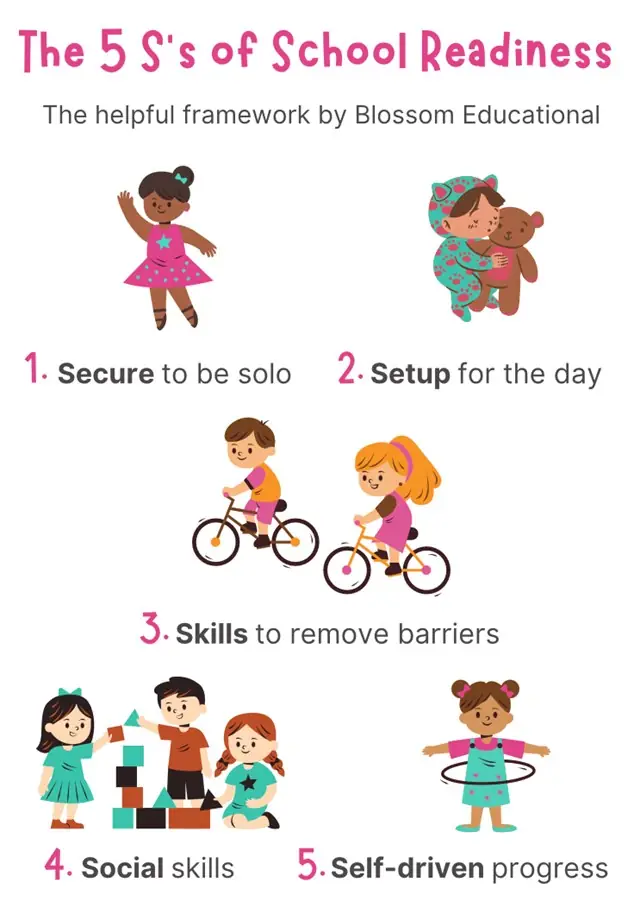
Emerging trends of children ready for school
Richard and his early years team see patterns of school readiness levels year after year.
‘Children are entering school with lower levels of Personal Social Emotional Development (PSED) and communication and language skills compared to previous cohorts.’
Richard Grogan, Headteacher Orchard Head Infant School
Children learn best when they engage with others and explore learning through play. Their development is affected when they experience communication or social barriers that prevent them from joining in with others.
It’s not just the team at Orchard Head Infant School that is noticing the trends. The latest school readiness survey highlights similar patterns. 49% of primary school staff recognise school readiness as a growing problem for children, with fewer children becoming reception-ready each year.
Toilet training is a big topic in early years. Over 25% of children joining reception are not toilet-independent. The time spent on personal hygiene tasks drains staff time of up to 2 hours per school day, taking children and staff away from learning time.
England’s average infant class size is 26.6 in a class, with a ratio of 1:13 (with a qualified early years teacher). That’s roughly seven children in each class who will need 1-1 support with toileting.

- 26% can’t listen and respond to simple instructions
- 32% cannot dress on their own
- 45% are unable to sit still for sustained periods
- 36% cannot play or share with others
- 25% cannot use basic language skills
How to get children school-ready
School readiness is a shared responsibility between nurseries, schools, parents, and other professionals, like health and social care teams.
Richard uses the 5 S’s of school readiness to share practical, tried-and-tested activities that prepare your nursery children for a smooth transition into reception.
Secure to be solo
When a child has a secure attachment with their parent or caregiver, they are confident to explore without them, knowing they will return and being supported in times of upset or fear. When a child leaves a parent to join school or nursery, it can be emotionally challenging for both the child and the parent.
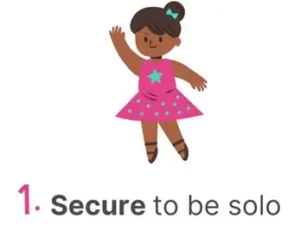
‘It is important to reassure parents their child is in the best hands with your early years team. When a parent is positive about the school experience, the positivity and excitement filters down to the child.’
Richard Grogan, Headteacher Orchard Head Infant School
Here are some tips for schools, nurseries and parents to support children to fly solo:
Tips for schools
- Clear and regular communication with parents
- A starter and introduction to the team pack
- Access to a virtual school tour
- Recognition of trauma-informed support approaches
- Good communication between nursery and school
Tips for nurseries
- Organised transition plans
- Increased time away from parents
- Introduction of new people in the summer months (like visitors and guest readers)
- Independence encouraged through EYFS activities
Tips for parents
- Manage personal anxieties by seeking support from others
- Asking plenty of questions (to the school and nursery team)
- Stay positive
- Trust the school staff – your child is in safe, caring hands
Set up for the day
Nursery and school days are a total emotional, social, and physical workout for children (and the school staff!). It is essential that children are set up well for the busy days ahead.
Share useful articles and information with your parents about all aspects of school day preparation.
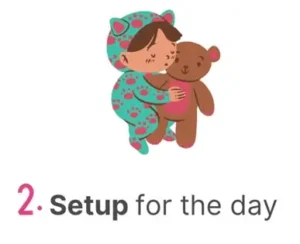
Here are some school readiness activity ideas Richard recommends trying during the summer months:
Emotional preparation
Social preparation
- Social stories to help with social situations
- Turn-taking and sharing games (try pair painting with one paintbrush or playing I Spy)
- Communication and language activities
- Meet new people and practise making friends
Physical preparation
- A good night’s sleep is essential (a child of 5 should be regularly getting 10-13 hours of sleep)
- A well-balanced diet (child nutrition should be tailored to their age and brain development)
- A solid routine
- Access to and skills to drink water independently (many schools only allow water, not juice, for healthy teeth – this is something to inform your parents about)
- Suitable clothing and footwear (most schools will offer support to parents struggling to afford school uniforms and suitable footwear – this can be included in your transition handovers)
- Toilet training (encourage parents to aim for their child to be toilet trained by the time they join reception, there are resources to help available on the Starting Reception website)
Skills for basic tasks
It can be helpful to consider these skills as ‘operational’. They are essential for children to access fun activities and fully immerse themselves in school life and learning.
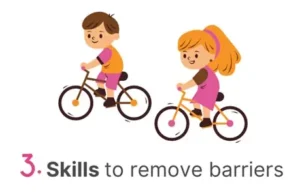
Richard gives some handy activities to target the school-ready skills needed:
Activities to increase independence
- Using zips and buttons
- Putting on socks and shoes (on the correct feet if possible!)
- Asking questions confidently
- Role-play and dress up
- Using cutlery
- Helping with tidy-up time
- Recognising shape patterns of their name
Activities for body control
- Fiddly tasks using scissors
- Outdoor active play
- Sustained play
- Carpet time
- Walking up and down steps
Speaking and listening activities
- Instruction games (like What’s the Time Mr Wolf?)
- Circle time
- Communication and language games
- Storytime (both short and longer stories)
- Oracy-focused activities
Social development
Social development is the ability to interact with others, including adults. Relationship building and maintenance is a big part of social interactions, as is the ability to communicate and articulate wants and needs.
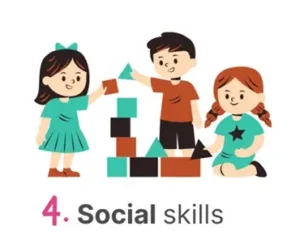
Richard talks us through some examples of how to boost social development to get ready for starting school:
- Turn-taking games
- Modelling self-talk (an approach for increasing self-regulation skills)
- Role play for meeting new people and making friends
- Managing friendship disputes
- Recognising emotions in others and building empathy
- Playing alone and in groups
- Games linking to Fundamental British Values (the underpinning messages of British Values are found across all stages of school readiness preparation)
Self-driven progress
We recognise that the children who join reception are 4 and 5 – they are at the start of their learning journey. Every infant school expects children to join at differing readiness points.
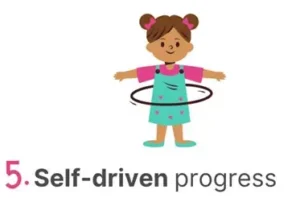
‘You can see a stark difference in the children who have the confidence and problem-solving skills that will stand them in excellent stead for their learning. We teach children in ways to boost their self-esteem, confidence and curiosity for learning.
‘Those who begin reception having mastered basic skills, have good communication and social skill foundations, find their feet very quickly.’Richard Grogan, Headteacher Orchard Head Infant School
When a child is independent, it doesn’t just mean they can put a jumper on without help: it also applies to how they approach their learning. The internal drive to stick with a task, try new things, and explore concepts through curiosity are skills needed for ‘self-driven progress’ in early years and throughout the child’s life.
Children (and adults) who are adept at ‘finding their feet’ in situations will have skills in:
- The use of initiative
- Resilience when a task is tricky
- Problem-solving
- Decision making
- Imagination
- Persistence to finish a task
- Openness to try new things
- Confidence to work alone or with others
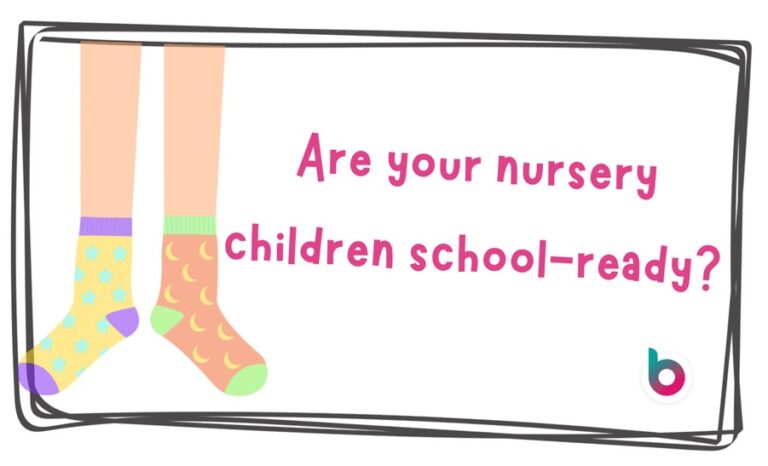
Think of the children you currently work with at your nursery, where do they sit on the road to school readiness?
Nurseries play a vital role in shaping a child’s early experiences and setting them up for a successful learning journey – but you aren’t in it alone. School readiness is a shared effort between schools, nurseries, parents and wider professionals.
There are growing challenges school starters face that can put them on the back foot when joining reception. With the right support, early identification, and targeted activities, children can confidently explore, communicate, and interact with the world around them.
Want to learn more about how nursery management software can improve your EYFS tracking, early identification and parent communication? We have a demo for that!